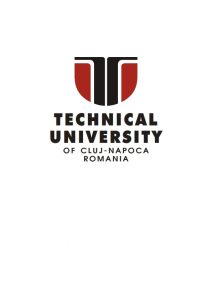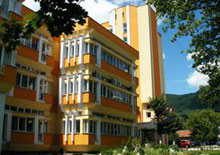The Tech nical University of Cluj-Napoca, an “Advanced Research and
Education University” as awarded with the Order of the Ministry
of National Education no 5262/September 5th 2011, is today a
tertiary educational institution having both tradition and
national and international recognition.
nical University of Cluj-Napoca, an “Advanced Research and
Education University” as awarded with the Order of the Ministry
of National Education no 5262/September 5th 2011, is today a
tertiary educational institution having both tradition and
national and international recognition.
The Technical University of Cluj-Napoca comprises twelve faculties in the two academic centres, Cluj-Napoca and Baia Mare, as well as in locations, such as Alba-Iulia, Bistrita, Satu Mare and Zalau. The educational offer, aligned to the Bologna system, includes bachelor’s, master’s and doctoral programs, as well as continuous training programs.
The fields of study have a wide range, from engineering to architecture, fundamental sciences, socio-human sciences and arts. Also, within the Technical University, the Department for Continuing Education, Distance Learning and with Reduced Frequency organizes and conducts continuous education activities and programs, postgraduate courses, continuous professional development programs or courses or based on occupational standards.
The Technical University of Cluj-Napoca is concerned with the international exchange of scientific values, and this trend is found in the over 400 inter-university collaboration agreements or in the large number of student mobilities. Opening up towards the European and world space of education and research through a steady process of internationalization is one of the major objectives of the university.
Research is, along with education, the main priority of the Technical University of Cluj-Napoca. In all faculties of the university there are research structures, from collectives, groups and laboratories, to research centers and platforms. The performance anchored in the socio-economic environment, the international visibility and cooperation as well as the scientific novelty and interdisciplinarity are some of the characteristics of the research environment of the Technical University of Cluj-Napoca.
Open research directions are oriented towards global priorities and perspectives: from the Information and communications technology to Renewable Energy and Ecology; from superconductivity, spintronics and nanomaterials, to management and robotics; from mechatronics and electrical engineering, to the automobile and the home of the future, or to urbanism and society.
Faculty of Civil Engineering
The tradition of civil engineering education in Cluj-Napoca starts with the year 1920 when based on the Governmental Decree no. 4206 of 19 October, the School of Public Works Technicians is set up, subordinated to the Ministry of Public Works and Communications. The decision to promote this type of education was made by the Romanian Government to develop vocational training and education in Romanian after the unification of the Romanian state (1 December 1918).The educational offer of this school was on the same line as other educational centres in Romania (Bucharest, Chişinău, Cernăuţi), with three-year courses for technicians in the field of communication and civil engineering.
The Faculty of Civil Engineering has managed to place itself in the elite of civil engineering higher education schools, a fact validated by the privileged relations with universities and faculties with the same profile in many countries: France, Italy, Portugal, Belgium, Greece, Hungary and others.Facing the future, a great challenge opens before the Faculty of Civil Engineering: the completion of the Romanian education reform by connecting to international academic standards, stimulating top research and creating sustainable connections with society both in economic and cultural terms.


